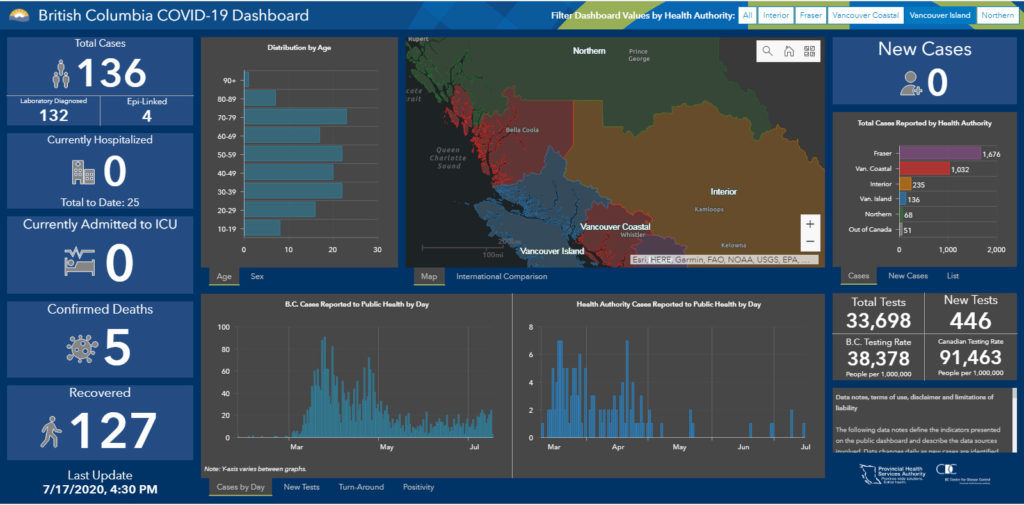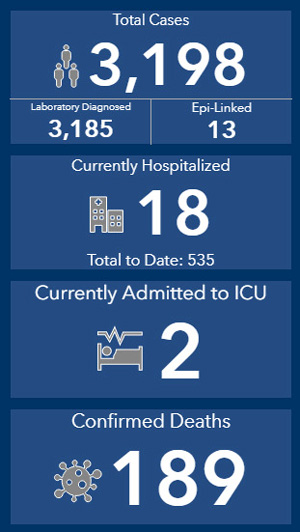
Sunday July 19, 2020 ~ VICTORIA, BC
by Mary Brooke, editor ~ West Shore Voice News
It’s no surprise to public health officials that the COVID-19 case tally has been increasing in BC since the loosening of restrictions on social interactions in the community. Provincial Health Officer Dr Bonnie Henry says this in pretty much every news conference now.
Now two weeks past Canada Day, the 14-day incubation period of COVID-19 infections is baring its teeth: about 20 new cases per day (or more) in the past two weeks (specifically 142 cases in the past week, or 20.28% per day, July 10 to 16), compared to about 10 per day before emerging into a fully active Phase 3 of Restart BC.
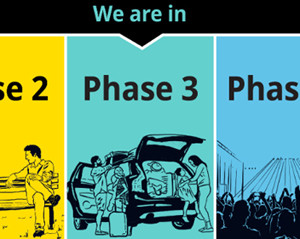
Phase 3 allows for stores and businesses to be open, and for travel around BC. Symptoms usually show between day 5 and day 7 after exposure, says Dr Henry.
Current tally includes a newborn:
There are 3,198 cases of COVID-19 recorded to date (July 17) in BC. Of those 28 are new as of Friday.
There were three deaths in the last week (July 9 to 16) due to COVID-19, all of them in the Vancouver Coastal area. The 189 deaths so far due to COVID-19 in BC tallies at 3.7 per 100,000 population. In BC, 61 in 100,000 people have become infected with COVID-19; 17% of those have required hospitalization.
There has also been one infection in a newborn at St Paul’s Hospital in the Vancouver Coastal Health Authority. On Friday July 17 Dr Henry says it’s not yet known how the infection got into the maternity ward at that urban hospital. Apparently the infant is doing well.
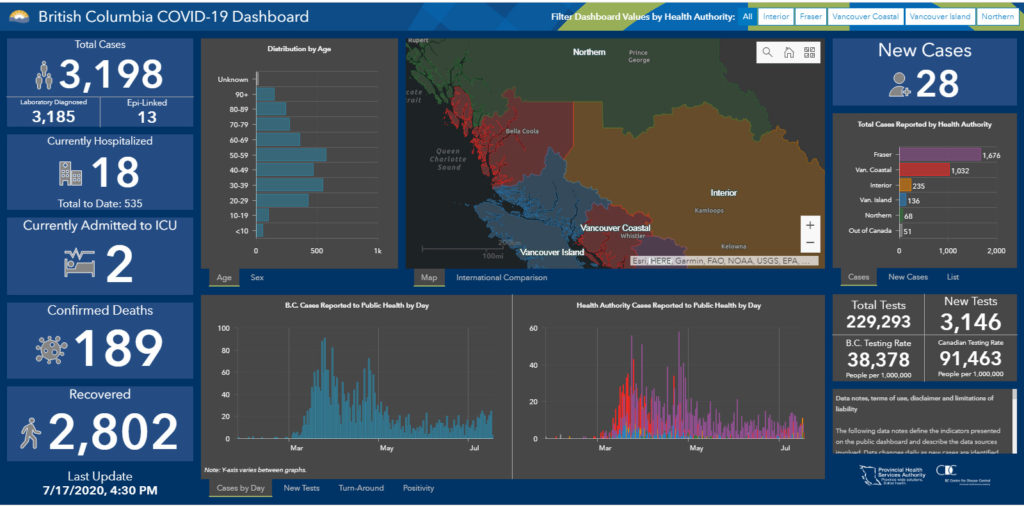
Public health achieved some goals and missed others:
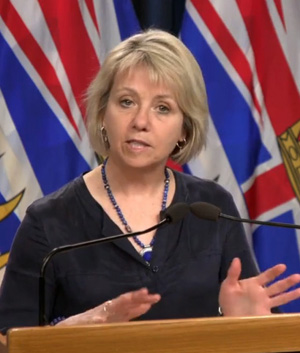
The young adult group seems to have ‘missed the message’ about the serious impacts of COVID-19 as a disease that impacts all ages, given the early and persistent public health thrust about protecting seniors (particularly seniors in long-term care).
It was well known by public health that the congregate living setup in long-term care and assisted living facilities was a hotbed for the spread of respiratory illness. To be seen as doing their utmost to protect seniors who they knew were effectively ‘sitting ducks’ during a viral pandemic, the public health messaging was repeatedly about “protecting our seniors and elders”.
While no one disputes the importance of protecting the older set, it is very evident that youth were not adequately addressed early on. The casual if not reckless disregard for physical distancing among young adults in recent weeks is a reflection of poor public health messaging to their age group. Reminders now come a bit late in the game.
“Once exposed there’s nothing we can do to prevent you from developing this disease,” said Dr Henry on Friday. She says that if people do get sick they are to take the necessary precautions to not pass it on to others.
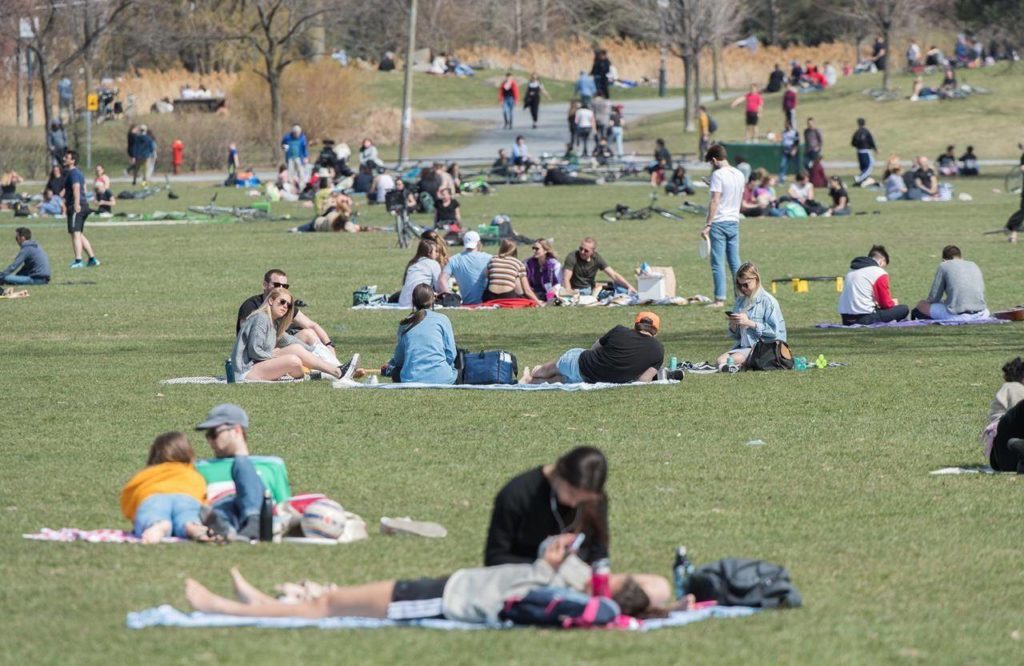
Given the many months of public health messaging about COVID being primarily of danger to seniors, elders and people with other health challenges (in part to protect long term care home residents where congregate living arrangements were already expected to be a problem for respiratory disease spread) — youth and young adults seem to have acquired a type of infection of their own: an undue sense of resiliency or type of immunity based on the power of good health and underwritten by the natural inclination of youth and young adults to feel they are invincible to most things in life.
Dr Henry says that 35 cases of COVID-19 are associated with community exposures around Kelowna from “around Canada Day and the following week”. That was “one of the more concerning issues to us … a number of events that have happened there.” She hopes people will “socialize safely over the coming weeks”.
COVID statistics by age grouping:
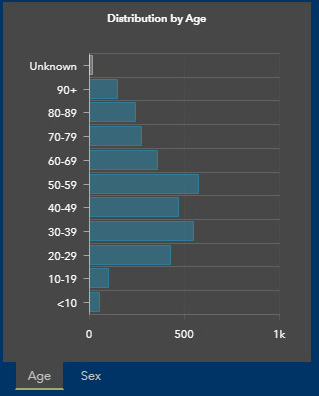
As of Friday 17, by age grouping, here are the BC Centre for Disease Control (BC CDC) case stats, with socioeconomic context:
Children and youth:
In children under age 10 there have been 51 cases of COVID-19 during the pandemic (no new cases in previous 24 hours). This group will be impacted by back-to-school in September.
The health impact of COVID-19 on young children is not fully known. COVID-19 infection appears to come along with the potential for cardiovascular impacts as part of multisystem inflammatory syndrome in children (MISC) which could have health impacts beyond the acute illness phase.
In the age 10 to 19 age grouping there have been 100 cases to date (3 new since July 15). Teen socialization is part of building adult lives. Restriction of their activity now will lead to mental, emotional, financial and educational issues later.
Children and teens do show resiliency to serious infection in most cases. Together the children-and-youth category has seen 151 cases, but no deaths.
Young adults:
In the age 20 to 29 year category there have been 424 COVID-19 cases to date, with eight of those being new in the previous 24 hours.
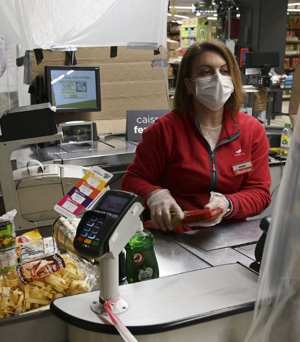
Young adults would normally now be branching out in post-secondary, career development and life-defining relationships but are being impacted by the social and physical distancing requirements of public health for managing the impact of COVID-19.
This age group provides a key component of essential workers during the COVID-19 pandemic, especially in the retail and hospitality sectors.
Mainstream working age population:
People in three ages categories combined — 30 to 39 years, 40 to 49 years, and 50 to 59 years — comprise the mainstream working age population in defined careers. They are maintaining families and building businesses. Many are working in key essential work sectors during the pandemic including health care, education, transportation and infrastructure maintenance. Collectively this is the age bracket that generates tax revenue for governments.
In the 30 to 59 composite age bracket there have been 1,585 cases of COVID-19, with 42 of those new in the 24 hours between July 16 and 17. Of the 42 new cases, 36 occurred in the 30 to 39 age group (thought to be evidence of social mingling on Canada Day weekend and at bars and home parties), with three in the other two age groupings.
The case tallies within the 1,585 total for the 30 to 59 age bundle are 546 cases (age 30 to 39), 467 cases (age 40 to 49), and 572 cases (age 50 to 59).
The median age for COVID-19 cases in BC is 50 years.
Young seniors:
The 60 to 69 year age group in BC could be seen as Tier 1 of the ‘older’ generation. The case count for this age grouping is 358 (as of July 17).
These are first-time seniors, most of whom are planning for or embarking upon a shift in employment or into some form of retirement. Many are still physically active and maintaining good health (though possibly with underlying or emerging health issues due to age). Many are active in their community.
While many in this age bracket are still working (a legacy for many due to negative financial impacts during the Great Recession 2008-2017) they are at the tail end of contributing to the tax revenue base. Many in this age group are starting to receive CPP/OAS and probably also private or independent pension income.
The median age for persons “ever hospitalized” with COVID-19 is 69 years, according to the BC CDC.
Older seniors:
In the combined age grouping of age 70 to 89 there have been 518 cases of COVID-19, with 1 new in the last reporting period (July 16 to 17). This Tier 2 of the older generation sees a larger number in long-term care homes or assisted living facilities or receive in-home care in their own homes.
To date, 401 residents of long-term care adn 255 staff been affected in health care facility outbreaks, said Dr Henry on July 17.
This age bracket likely has health challenges and requires various types of supports for shopping, delivery, errands and transportation.
Many could be considered financially stable in that they receive CPP/OAS as well as many also receiving additional private pension income. But many seniors do not have adequate income, which contributes to health issues.
In current BC CDC statistics (July 16), the median age for COVID deaths is 85 years.
Elders age 90+:
This Tier 3 grouping by age is the most vulnerable to COVID-19, as has been declared by public health since the start of the pandemic. Frailty related to age is the main reason for susceptibility to the viral infection which strikes hard at the lungs, heart tissue and cardiovascular system.
The majority of persons in this age group likely reside in long-term care homes or assisted living, in fragile health.
There is a high-impact on the provincial health care budget to maintain this age group.
As of July 17 there have been 148 cases of COVID-19 in this age group (no new cases in the previous 24 hours).
Vancouver Island profile:
There have been 136 cases of COVID-19 on Vancouver Island since the beginning of the pandemic. No new cases in the latest report (July 17). No one is presently in hospital within Island Health for COVID-19. There have been five deaths on the island from COVID-19.
